by Aneesha Dhargalkar, MD
Published 9/12/23 © 2023 Aneesha Dhargalkar, MD
Imagine a clinic where patients are seen as long as necessary, without a 15-minute deadline. Where the staff helps the patients fill out any required forms. Where not just medical, but also dental and eyecare issues are addressed. Where all the necessary drugs, tests, procedures, and care are free.
What you are imaging actually exists in Pennsylvania, and it is called Community Volunteers in Medicine, or CVIM.
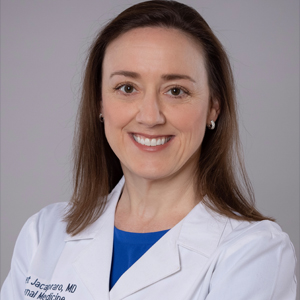
CVIM is one of the largest free clinics in the United States. Its main site is in West Chester, Pennsylvania, with two additional microsites in West Grove and Coatesville. The mission of this organization is to provide free, high-quality healthcare to uninsured working people with low incomes. CVIM aims to help its patients live healthy, productive lives and assure equal access to health care for the residents of Chester County, PA.
In January 2022, Dr. Janet Jacapraro became the medical director of CVIM, which is celebrating its 25th anniversary. It’s a role she loves because it allows her to “still see patients and do what [we] went into primary care to do, but also to sort of take that 10,000-foot view and see how we can improve healthcare delivery and be innovative to meet the need.”
Scope of the Problem
CVIM takes care of around 5,000 patients yearly through its main and affiliate clinics. To qualify, patients must be uninsured and have a family income of less than 300% of the poverty line. Around 70% of the clinic’s patients are primarily Spanish-speaking, and almost two-thirds are women.
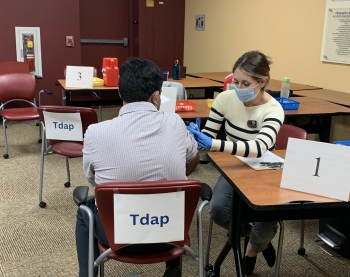
The majority of medical issues patients present with are like those seen in most practices and hospitals and include obesity, diabetes, and high blood pressure. However, poverty compounds and worsens these medical problems. CVIM works hard to address these issues in a variety of ways. “There’s always a socioeconomic hurdle that you have to get over and think through,” Dr. Jacapraro said.
For example, food insecurity is an issue that affects many of the clinic’s patients. To help address this need, the clinic offers food baskets provided by the Chester County Food Bank so patients can create healthy meals for their families. A recipe card is included. There is often an opportunity to cook the meal right at the clinic itself. In addition, patient education is a vital part of the clinic’s work. All education is provided in both English and Spanish. Information is given on topics such as vaccinations and the harm of sharing medications and medical devices.
Making sure all her patients are well enough to return to their jobs is a priority for Dr. Jacapraro. “if they can’t work… that’s it. There’s no retirement fund, there’s no 401K, there’s nothing like that, so people really work until they can’t….A lot of times, they’re supporting a multi-generational household so if they’re not working, it’s bad news for everybody.”
Commitment to Service
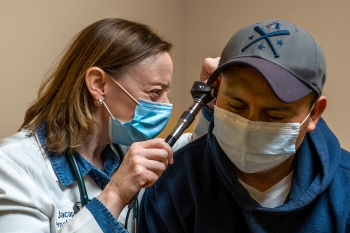
Dr. Jacapraro has committed herself to community service ever since attending college. Upon graduation, she worked for two years at a residential treatment center for children with mental health conditions. After attending a post-baccalaureate program, Dr. Jacapraro worked at a methadone clinic at the Johns Hopkins Hospital campus.
While at the University of Maryland medical school, she planned to pursue a career in psychiatry specializing in addiction. However, during and after her training, Dr. Jacapraro worked at Comprehensive Care Practice, a clinic offering multiple services including HIV, hepatitis C, and opioid abuse treatment. Her work with the homeless and uninsured patients in this clinic changed the trajectory of her career to one of service to the underserved citizens in her community.
After some time at Comprehensive Care Practice, Dr. Jacapraro worked at a federally qualified health center in Baltimore, Maryland called Healthcare for the Homeless. She eventually became its medical director. A change in her husband’s career led them to Pennsylvania in 2019. She started volunteering at CVIM on Monday nights while working at a primary care clinic in the area. When the role of medical director opened up in January 2022, she jumped at the chance to take it on.
Depth and Breadth of Services
CVIM provides a large range of medical and dental services. There is a strong optometry presence with multiple services offered, including basic vision exams, eyeglass prescriptions, and glaucoma testing. Gynecologists will see patients regularly in the clinic for yearly exams, pap smears, and intrauterine device (IUD) insertion and removal. Urologists and general surgeons also do simple procedures in the clinic. Physical therapy, psychiatry, and behavioral health counseling are all provided at CVIM.
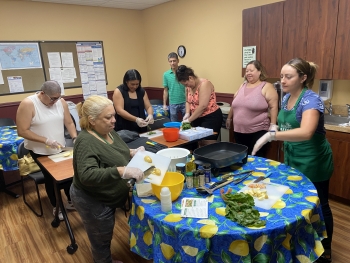
The clinic is reviewing a potential opportunity to do carpal tunnel surgery at its site. Carpal tunnel syndrome affects a large number of patients coming to the clinic due to the repetitive work done by many of its patients.
Dental care is one of the largest services offered at the clinic. There are multiple exam rooms to perform routine dental exams as well as any procedures needed. The space devoted to dental services also has an x-ray machine to image a patient’s teeth and jaw. The clinic will often take in busloads of children from local school districts who receive cleanings and fluoride therapy.
Besides these specialties, the clinic offers many other services. There is a full dispensary in the clinic which provides the majority of medications patients need. This dispensary manages around $4 million worth of medications each year. In addition, the clinic hosts a lab where bloodwork can be done right on-site. This lab has a PCR machine that can tell whether or not a patient has RSV, flu, or COVID-19. Other machines perform testing for urinary tract infections and strep throat.
Transportation is a major issue for many patients. Therefore, to have one place where you can see a doctor and then get all the bloodwork, testing, and medications ordered by that doctor is key. Dr. Jacapraro summed it up best when she said, “It’s amazing that we can do so many of the things we can do here.”
Community Collaboration
CVIM has a strong relationship with its local hospitals. They process bloodwork, perform general and advanced imaging, and provide specialty services for the clinic’s patients.
In addition, the clinic has multiple community partners. For eye care, Salus University and Siepser Vision provide the equipment and supplies for the exam room. The clinic works with a local company to provide eyeglasses for patients. Dispensary of Hope, Americares, and Direct Relief are some of the organizations that give medications to the dispensary at the clinic. The clinic is working on institutional applications for specific therapies from Merck and Pfizer such as intrauterine devices (IUDs) and vaccines.
Dr. Jacapraro is proud that CVIM patients never pay for medicines. The clinic always finds a way to get patients what they need.
The community also plays a large role in the funding of CVIM. CVIM is a free clinic, so it does not qualify for federal funding. It is solely funded through donations from corporations, healthcare organizations, community partners, faith-based groups, and private donors.
The clinic has a development team consisting of staff employees and volunteers. They create the clinic’s marketing materials, foster donor relationships, and apply for grants. This all adds up to the clinic’s impressively low $5.2 million yearly budget.
Modeling Team-Based Care
Team-based care is the key to providing patients with everything they need. Given the challenges faced by the clinic’s patients, it is not enough just to visit the doctor. Many nonmedical factors play a major role in the patient’s health and well-being.
For example, certain medicines may not be available at the clinic’s dispensary. Paperwork is often required to obtain those medicines through various patient assistance programs. Staff and volunteers at the clinic sift through all the eligibility criteria. They then fill out the forms required to get patients the medications they need.
Other members of the team include:
- A bilingual nutritionist and diabetic educator on-site to educate patients on the correct foods to eat for their medical issues.
- A public health coordinator who provides a variety of patient education materials and coordinates monthly campaigns focused on topics such as tuberculosis testing and diabetes management.
- A patient care coordinator who helps patients schedule imaging studies and lab work.
- Social workers who help with the multiple social determinants of health, including rent assistance and electrical bills.
Volunteerism at its Finest
There are approximately 50 staff employees who are the backbone of CVIM. These staff members include nurse practitioners, nurses, social workers, case managers, care coordinators, and the front desk staff.
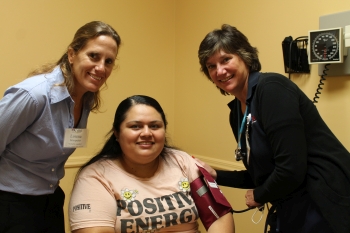
But the shining light of CVIM is the dedicated commitment of the clinic’s volunteers. There are approximately 100 medical volunteers, including physicians, physician assistants, nurse practitioners, and nurses.
The majority of volunteers are retired clinicians interested in continued engagement in patient care. Some providers have transitioned to nonclinical careers but still want to maintain their medical skills. Nonclinical volunteers work on the administrative side of the clinic, helping with medical record organization and grant applications. To keep things functioning smoothly, the clinic has a care coordinator whose primary job is managing the schedule of all these volunteers.
Dr. Jacapraro finds that the volunteer staff enjoy their time at the clinic for multiple reasons. First, since CVIM is a free clinic, the stress around navigating the medical insurance system disappears. Providers do not need to worry about codes or payments. They also don’t have to worry about time because every visit is 45 minutes long. “The churning and burning of 15-minute primary care visits is not there.”
In addition, the medical providers enjoy the collaboration that takes place in the clinic. They will often get together to document their work and discuss patient cases among themselves. If they have a question or are unsure about how to get a certain resource for a patient, there are seasoned staff members who can provide support.
These staff members make up a “brain trust” that serves multiple purposes. They help volunteer providers manage the social aspects of a disease process or deal with conditions that are specific to the clinic’s patient population. In addition, they excel in figuring out how to get each patient what is needed.
Finally, these dedicated staff members serve as the connecting piece between the periods when volunteer providers work at the clinic. They will often check on patients’ lab work and imaging so that all testing results have been addressed. This allows for the continuity of care which is important in the primary care setting.
The gratitude from the patients at the clinic is unparalleled. Dr. Jacapraro related a story that perfectly demonstrates this. “There are a couple of patients who own restaurants and, every now and then, someone drops off a box of samosas. And it’s like, oh, they don’t even need us anymore, but they remember us and they remember what we meant to them and what we did for them.”
Future Opportunities
Dr. Jacapraro is optimistic about the future of CVIM and sees many opportunities for growth.
First, she would like to expand the behavioral health program. Many of the clinic’s patients have gone through trauma and would benefit from counseling services. “They left their home country [because of] trauma or they experienced trauma along the way. Trying to acclimate to a new country, find a new job, trying to make ends meet, trying to figure out transportation, trying to get your kids to school….It’s a whole lot of things happening.” Because of the primarily Spanish-speaking patient population, it is important, but challenging, to find bilingual counselors and psychiatrists for the program.
Behavioral health visits also offer a good opportunity to grow telehealth within the infrastructure of CVIM, something that Dr. Jacapraro wants to expand. Other areas where she feels telehealth may be helpful include follow-up appointments to talk about lab work or blood pressure.
Dr. Jacapraro believes that there are not enough studies dedicated to the primarily Hispanic population seen at CVIM. She would like to explore partnering with other primarily Hispanic clinics to run studies. Topics could include medication compliance in patients with diabetes or the prevalence of fibroids in Hispanic women.
There is always a need to add additional service lines to the clinic. For example, many of the clinic’s patients have jobs that detrimentally affect hearing, such as construction. However, the clinic is currently lacking an audiology resource to get patients tested and fitted for hearing aids.
Conclusion
Dr. Jacapraro decided to ultimately pursue a career in primary care because of the patient stories. “I think that’s why I was driven to underserved populations…because those stories are so compelling. It’s so nice to partner with those patients. And, even though there are a lot of setbacks and progress can be slow — when it happens, it’s so rewarding that it makes up for everything else.”
CVIM is the expression of Dr. Jacapraro’s goal to provide the best care possible to her patients. “I think people come here for the mission, they’re very mission-driven. And, it’s nice to be in that space with people.” Here’s hoping that CVIM will continue to thrive with Dr. Jacapraro as its lead.
About the Author
Dr. Aneesha Dhargalkar is an emergency medicine physician in Chester County, PA. She has a passion for healthcare worker well-being and is an aspiring medical writer. Dr. Dhargalkar can be reached at aneeshamd@gmail or through her LinkedIn page.

Hey! CVIM stands for Centre Volunteers in Medicine, not community volunteers in medicine. Additionally, calling it a “free clinic for Pennsylvania’s poor” is disturbingly insensitive and in very poor taste. I hope you all reconsider!
Thanks for taking the time to read the article and comment, Lauren! Perhaps “Centre” is an alternate name, or a different clinic? The website https://www.cvim.org/ says “Community Volunteers in Medicine.” As for using the term “poor people,” I suppose one can say economically disadvantaged, impoverished, low socioeconomic status, destitute, indigent, and many other terms. But I like to follow Dr. Paul Farmer, who has probably done more to help the impoverished world than anyone else. One of his many books is Partner to the Poor, another is In the Company of the Poor, a third one is Pathologies of Power: Health, Human Rights, and the New War on the Poor. He never hesitated to speak plainly about the people he was helping. That’s good enough for me. Thanks again for writing and sharing your thoughts.